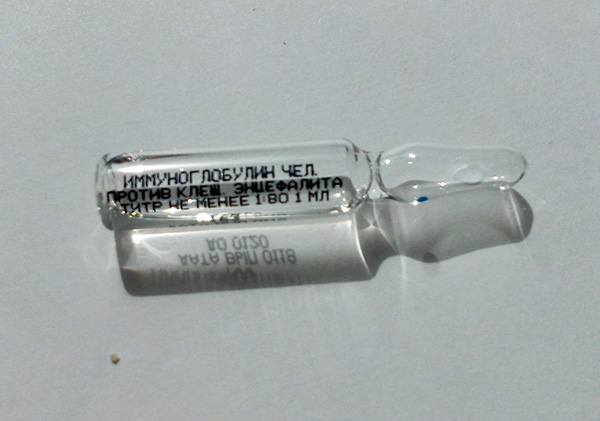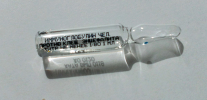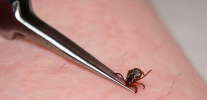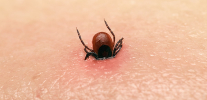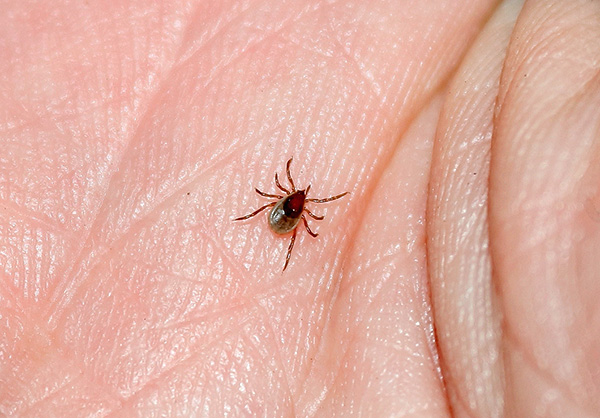
When the tick activity season comes, many people are puzzled about finding a way to protect themselves and their family members from the infections carried by these parasites. The most dangerous of these infections is tick-borne encephalitis (TBE), since its etiotropic treatment does not exist today, and the mortality rate among people who become ill with it remains very high. The remaining tick-borne infections are either extremely rare or can be treated quite successfully with timely medical attention (for example, tick-borne borreliosis).
Thus, tick-borne encephalitis vaccination is a guarantee that being in nature will not be of mortal danger for a person, and even an already attached tick found on the body will not be a cause for alarm (you can simply remove it and throw it out it is not necessary to take the parasite for analysis).
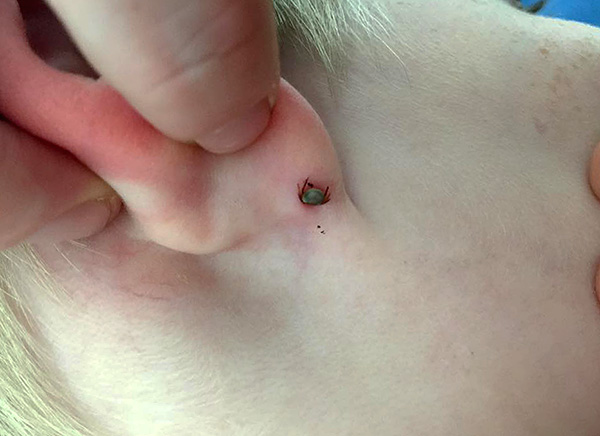
It should be understood that in some cases there is no special need for vaccination against CE, in other cases it is desirable, in the third case it is strictly obligatory. It depends on a lot of factors, including those related to human health.
At the same time, even with all indications, it may not be so easy to vaccinate. The vaccination procedure is quite complex, is carried out in several stages and is not available in all clinics.
Let's see what a tick-borne encephalitis vaccine is, whether it is always effective, how to properly prepare for it and, importantly, in which cases it should be abandoned even when in a potentially dangerous region ...
What is the vaccination against tick-borne encephalitis and how does it work
Tick-borne encephalitis vaccine is a substance from a variety of formalin-deactivated viral particles adsorbed on a special inert carrier - aluminum hydroxide. Manufacturers obtain viruses by breeding them in chicken embryos in laboratories, where the most favorable conditions are created for the formation of a large number of infectious agents.Then virions kill with formalin and fix on the carrier.
On a note
It is important to note that there is virtually no formalin in the finished vaccine, since it goes through several stages of purification. But depending on the origin, the preparation may contain various excipients, including sucrose, some salts, as well as human albumin. The presence of the latter may be the cause, albeit relatively rare, but reliably recorded cases of allergic reactions to the vaccine.
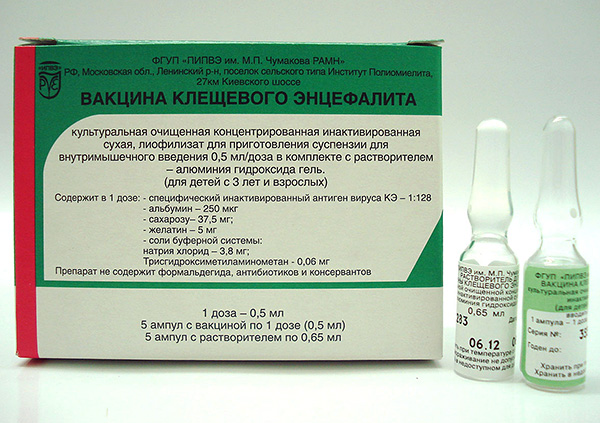
For tick-borne encephalitis vaccines, the method of storage and transportation plays a very important role. The standard shelf life for most of them, depending on the manufacturer, is 1-3 years. To transport over long distances can only air transport. They should be stored at 2-8 degrees Celsius, and freezing is strictly prohibited.
In case of any violations of these storage rules, the vaccine is considered unsuitable for use.
It is important to know
If deviations from the vaccine storage regime were observed, it can be registered visually - the suspension becomes non-uniform, it becomes visible flakes that are not broken by agitation.Therefore, before the injection will not be superfluous to evaluate the appearance of the drug.
The mechanism of action of the vaccine is quite simple. Despite the fact that tick-borne encephalitis viruses have already been deactivated, they still contain antigens on their surface - special markers for the human immune system. They start the production of antibodies - special proteins, which, if necessary, will join the live KE viruses, deactivate them and start the process of destruction, blocking the penetration into cells and replication of the virus in the body.
In fact, the vaccine acts standardly - it stimulates the production of a specific immune response specifically to tick-borne encephalitis virus.
If an encephalitic tick bites later on a vaccinated person, the virus particles trapped in the body will be quickly identified and neutralized by the prepared immune system - the antibodies will bind to the virus antigens and prevent the disease from occurring. If encephalitis virus enters the blood of a person who has neglected vaccination, a completely different picture is observed. The body of such a person is not yet familiar with the structure of the infectious agent, and it takes time to build up the necessary amount of protective proteins.During this period, the virus often already has time to multiply rapidly in the body of the infected, and the disease begins.
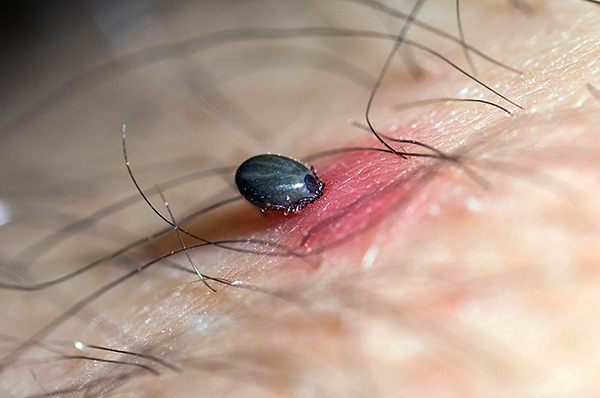
The vaccine, put according to all the rules (or rather, the course of vaccinations), with a probability of 95% provides protection against tick-borne encephalitis when the virus enters the body after a tick bite. Cases of the development of the disease after vaccination are extremely rare, but they also pass easily and without serious consequences.
However, it is important to remember that lifelong immunity to tick-borne encephalitis does not form, and after a certain period of time, the concentration of antibodies to the virus in the blood decreases. For this, revaccination is carried out once every three years. The entire course of several injections is not necessary to repeat, it will be enough just one vaccination to re-form a stable protection.
The effectiveness of vaccination against tick-borne encephalitis
As noted above, in 95 cases out of 100, the vaccine provides guaranteed protection against the development of tick-borne encephalitis. In the remaining 5% of cases, the disease, if it develops, then proceeds gently, with a blurred symptomatic picture, and does not threaten the life of the patient.
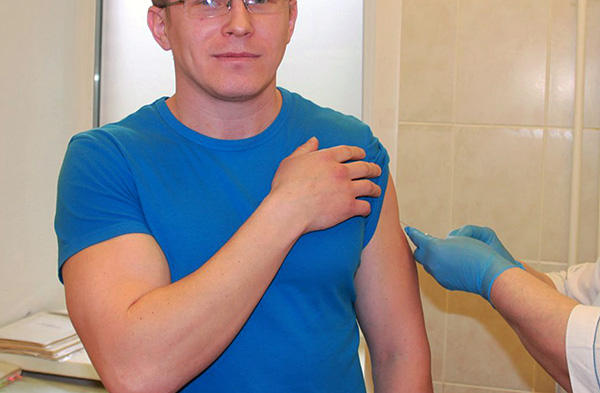
It is important to understand that tick-borne vaccination does not protect against all the dangers potentially associated with tick bites, but only against a specific disease - from tick-borne encephalitis. Ticks can bite a vaccinated person as actively as they will bite an unvaccinated person - in some cases there is a risk of transmission of other infections, for example, Lyme borreliosis (see also borrelia mites). In this regard, even in the presence of vaccinations against CE, one should not neglect the precautionary measures regarding protection against tick bites, such as suitable clothing and special deterring agents.
On a note
Vaccines are produced in different countries, and, accordingly, developed for different strains of tick-borne encephalitis virus. The difference in strains means that a virus that infects people, for example, in Austria, will differ slightly from that in Altai, but both will cause the same disease.
Fortunately, there is no reason to worry that a European vaccine may be ineffective anywhere in the taiga. According to medical tests, all existing anti-encephalitis vaccines are now interchangeable - their antigenic structure is about the same 85%.And this means that, having been vaccinated, you can protect yourself from tick-borne encephalitis when going to any corner of the world.
The maximum period of protection after a course of anti-encephalitis vaccination is five years. But doctors recommend doing a single injection of the vaccine more often:
- Once every three years after the initial course, if the person being vaccinated lives in an epidemiologically dangerous area;
- Before the next trip to an epidemiologically dangerous region - this is important for tourists, hunters, workers, whose activities are fully or partially carried out in nature in dangerous regions and who come here on a specific schedule;
- Once a year for people who work under conditions of increased risk of infection.

The entire course of vaccinations must be repeated anew if more than five years have passed since the last vaccination and the person needs to go back to the area with an abundance of ticks and a high risk of infection with encephalitis.
It is important to remember that the first vaccination in the course does not provide sufficient protection against infection, and therefore vaccination should be planned in advance. It is absolutely unacceptable to get vaccinated in Moscow today, and tomorrow to fly to Yekaterinburg to enjoy the nature of the Ural forests.Traveling to areas potentially dangerous for tick-borne encephalitis should be carried out no earlier than two weeks after the second vaccination - after this period, a sufficient amount of antibodies that can resist the virus accumulate in the blood.
Who should definitely take root
It is strictly imperative to vaccinate people living in regions that are unsuccessful for tick-borne encephalitis — that is, in the area where the disease is registered quite often. Information on such regions of Russia is available in many health care institutions (often the relevant posters are simply hung in polyclinics on the walls to inform the public).
The picture below shows the regions most dangerous for tick-borne encephalitis:
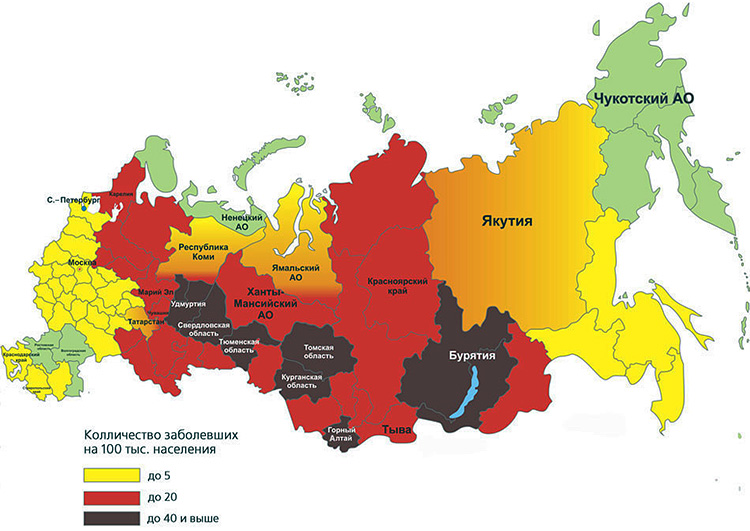
On a note
The tick-borne encephalitis virus is strictly limited to the areas where its carriers live - ixodic ticks. And not every tick is infected, and the percentage ratio of infected to normal individuals differs in different regions, and the probability of infection from a parasite bite varies greatly.Moreover, even if a tick infected with a CE mite bites a person, the probability of getting sick without taking appropriate measures does not exceed 5-6%.
Read more about how the tick bites and what determines the probability of infection by an infection in a separate article: How the tick bites: in detail about the process when it digs into the skin.
However, even the relatively low risk of tick-borne encephalitis is fraught with severe disability and even death. Therefore, even if a person does not live in a dangerous region for tick-borne encephalitis, but plans to go there for a short trip (with a trip to nature), vaccination is also a strictly mandatory procedure.
Special attention should be paid to people whose professional activities are related to work in the forest. These are, for example, huntsmen, foresters, sawmill workers, tourist guides. For these people, due to their activities, encephalitis vaccination can not only once be the salvation of life and health.
And finally, children are considered a separate risk group. Due to their usual hyperactivity, love for outdoor games, short stature and thin skin, children are especially often prone to tick bites, and, as a result, infected with tick-borne infections.Therefore, when they are infected, for example, in a children's camp, at a picnic or fishing, vaccination is a necessary step.
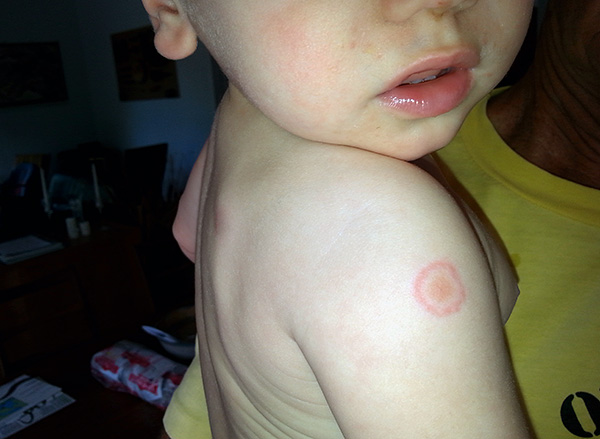
On a note
Children up to three years without the extremely strong need for vaccination against tick-borne encephalitis is not prescribed.
Thus, the main indication for vaccination is a permanent or temporary stay in the zone in which CE is found relatively often. In the event that a person lives in a zone of reduced risk and does not plan to travel to dangerous regions, there is no need for vaccination.
On a note
Some people, worrying about their pets, are interested in whether they can be vaccinated against tick-borne encephalitis. Dogs and cats are not susceptible to the destructive effect of this virus, and therefore vaccines for pets specifically from EC do not even exist. Piroplasmosis, which pathogens are also tolerated by ixodic ticks, is incomparably more dangerous for animals.
Any person, regardless of age, for vaccination must be examined by a doctor who "gives the go-ahead" for vaccination. Such an examination is usually done right on the day of vaccination in order to verify the satisfactory state of health of the patient.In this regard, it is useful to take into account some of the nuances of advance preparation for vaccination, which we will discuss later.
Vaccination preparation
There are no strict rules to prepare for vaccination against tick-borne encephalitis - it is not a severe stress for the body, and in most cases it is tolerated quite easily.
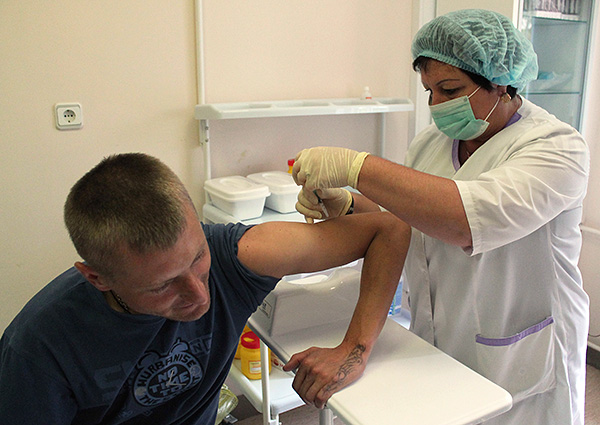
However, there are several recommendations that will help reduce the likely side effects to a minimum and quickly adjust the functioning of your immune system:
- Proper nutrition before vaccination (at least 3 days before the procedure and 3 days after). Here we have in mind a diverse and sufficiently high-calorie food, rich in vitamins and fiber, as well as balanced in the combination of proteins, fats and carbohydrates. In other words, food must provide the necessary amount of energy and vitamins for the body. But overeating is harmful at the same time - this can to a certain extent make it difficult (slow down) the formation of immunity, since the main forces of the body will be thrown not on the production of antibodies, but on the digestive processes. The same applies to alcohol - it is not recommended to drink it before inoculation, although a small amount of alcohol in the blood is not a strict contraindication to vaccination;
- The elimination of contact with substances that are known to be strong allergens for the body. Today, many people suffer from allergic manifestations of certain foods or household substances. But since an allergy is inherently an immune response, during the period of its passage the body can react to the vaccination not quite adequately - a cascade of immune reactions can reduce the effectiveness of vaccination;
- The absence of somatic diseases in the acute stage. Going with flu for tick-borne encephalitis vaccine, for example, is not a good idea. The reason is still in the same overload of the immune system, the main forces of which at this time are thrown into the fight against ARVI. Vaccination in this case can slow down recovery, and in the event of the development of adverse reactions significantly aggravate the patient's condition.
In general, it is very important before vaccination to bring your immune system to a stable state - then the procedure will be effective and pass with minimal inconvenience.
On a note
A mild cold is not a contraindication to vaccination, but high fever and frankly poor health should certainly become a reason to postpone vaccination.
Types of anti-encephalitis vaccines
Today, the market presents 5 of the most well-known vaccines, three of which are Russian, and two are imported. Despite the fact that they are called differently, the main active ingredient in all the same and is an inactivated tick-borne encephalitis virus.
The Russian versions of the vaccine are specifically developed against the strain Sofyin, which causes one of the most severe forms of the disease, while imported vaccines carry the antigens of Western European strains of tick-borne encephalitis virus, for example, K-23. Despite these differences, all five vaccines are interchangeable and effective against any virus strains.
The following are some of the features of today's popular anti-encephalitis vaccines:
- Tick-E-Wack is a Russian vaccine registered in 2012. Among the excipients contains human albumin, sucrose, salts. It is recommended in two dosages, according to age: children - from a year to 16 years, and adult. In the description of the vaccine, common malaise, weakness, redness of the injection site, temperature up to 37.5 ° C are indicated by common side effects.It should be noted that in most patients all unpleasant symptoms disappear within 3 days after vaccination;
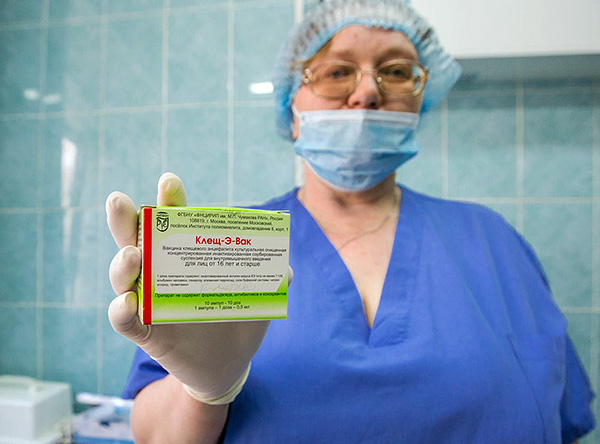
- Entsevir is also a Russian-made vaccine, known on the market since 2004. The excipients are the same as those of the Tick-E-Vac vaccine. Children's dosage in the official instructions to the drug is not, it is recommended for use only from 18 years. The main side effects are the same, and their symptoms also last no more than three days;
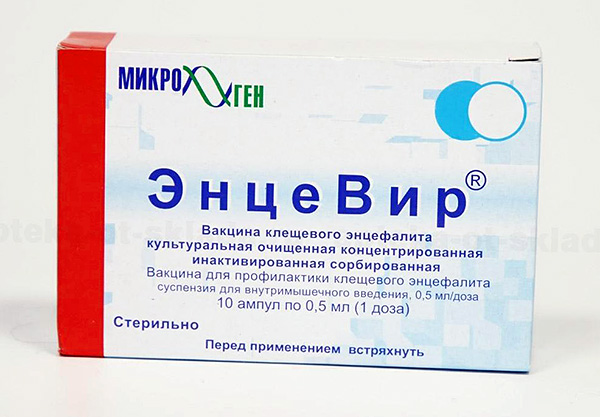
- Tick-borne encephalitis vaccine is a cultured, purified, concentrated, inactivated dry - another domestic product registered in 2013. In terms of the number of excipients surpasses the two above-mentioned vaccines - here, in addition to classic additives, bovine serum albumin, gelatin, and protamine sulfate are also present. The drug is designed for use in adults and children from three years. Adverse reactions and their frequency are the same as in previous analogues;
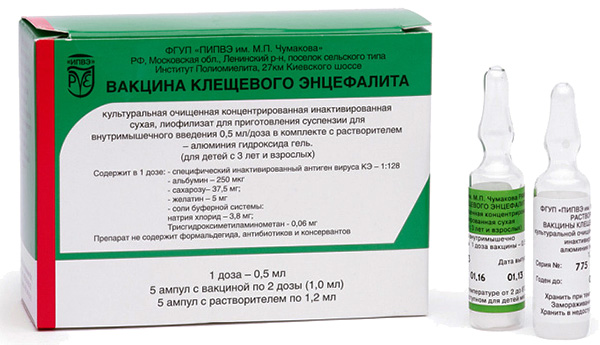
- FSME-Immun (for example, FSME-Immun Junior) is an Austrian anti-encephalitis vaccine known since the last century. There are only two excipients in it - human albumin and aluminum hydroxide.The manual also indicates the presence of trace amounts of formaldehyde - thousandths of a milligram per 1 ml. Despite this, according to patients, this vaccine is more easily tolerated in Russia and causes fewer side effects. There are two options: children can be used from 1 year to 16 years, and after reaching the age of 16 put an inoculation in adult dosage;
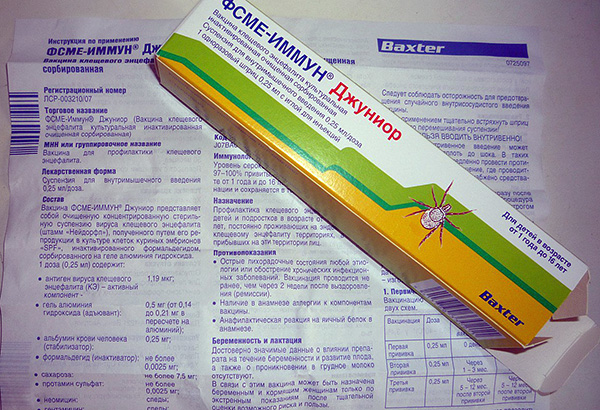
- Encepur - vaccine, produced in Germany since 1991. Despite the fact that it is the “oldest” of all the above, it is the only drug, after the correct use of which, not a single case of tick-borne encephalitis was recorded. Another indisputable advantage is the minimum of auxiliary substances. In particular, the vaccine does not contain either human or bovine albumin, which contributes to easier recovery after vaccination with a minimum of negative effects. It is used both in adult dosage (from 12 years old) and in the nursery (from 1 year to 12).
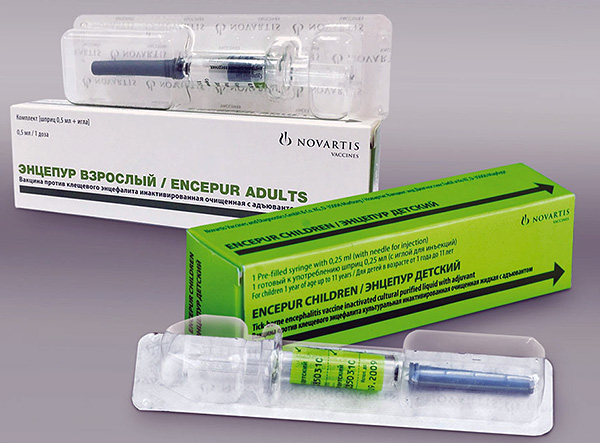
Thus, it can be noted that the differences between vaccines, in addition to the names, consist in the range of additional components present in the composition, as well as in the characteristics of the dosages according to age.None of the anti-encephalitis vaccines can fully guarantee the absence of adverse reactions, but some pattern in the tolerability of Russian and imported drugs is still present (imported ones are better tolerated on average).
Technique and frequency of vaccination
The course of three vaccinations against tick-borne encephalitis should be carried out on a special schedule within certain time intervals. Depending on the recommendations of the manufacturer of a particular vaccine, these schedules may vary slightly, but on average they are about the same.
There are two vaccination schemes: standard and emergency. The existence of the latter is due to the need as soon as possible to form a person's immunity to tick-borne encephalitis virus, when necessary. But even in an emergency, a minimum of 1-1.5 months is required, therefore, it is not necessary to count on the production of immunity in a couple of days.
The standard scheme includes the interval from 1 to 7 months between the first and second injections, and the third is carried out in 9-12 months. A more accurate time between vaccinations for each type of vaccine is indicated in the instructions for use.It is usually considered ideal when the patient makes the first vaccination in the fall, and the second closer to May, six months later, just before the tick activity begins (more about the tick activity season and the stages when they are most dangerous for humans, described in a separate article: When does the tick activity season begin and end).
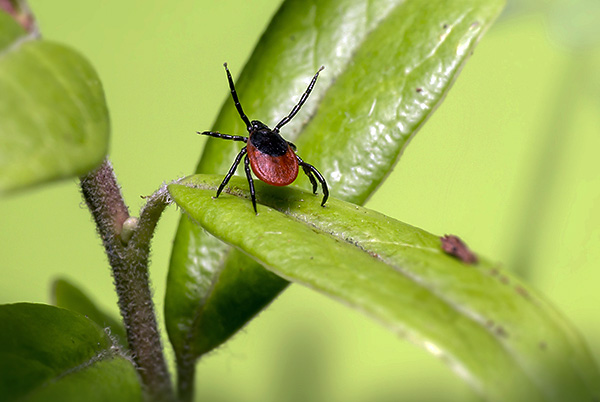
On a note
2 weeks after the second injection, the maximum level of protection is provided, and a person, therefore, may not worry about encephalitis during the whole warm season. Revaccination is carried out as a single injection once every three years after either of the two immunization options.
Emergency circuit is much faster. The interval between the first and second vaccinations ranges from a week to a month, which allows you to prepare the immune system for a meeting with the virus within 21-45 days from the first vaccination (data given taking into account the two-week period after the second injection). The third injection, in turn, as in the standard scheme, is carried out in 9-12 months.
Thus, when planning a trip to a region with a tick-borne encephalitis dysfunction, you need to have a decent amount of time to prepare your health for the possible risks.
Sometimes there are moments that on the appointed date, it is impossible to make a second vaccination - the cause of this can be both a disease and other circumstances. But this does not always mean that the course will need to start over. For each vaccine, there are recommended periods of time over which the next vaccine should be given. If the delay does not exceed 1-2 months, there is no need to repeat the entire vaccination again, one injection will suffice. But if more time has passed, you will have to go through the whole course of vaccinations again.
If revaccination was missed, that is, more than three years after the third vaccination, then before the expiration of the five-year period it is still possible to limit one injection of the vaccine. If more than five years have passed, it is considered that the course must be conducted first.
It is important to note that it is better to wait a little with anti-encephalitis vaccination, if there were any other vaccinations less than a month ago. A break of 4 weeks after the previous vaccination with any other drugs is considered optimal. However, the introduction of two different vaccines in one day, if necessary, is allowed, but should be carried out in different parts of the body. In addition, the combination of anti-encephalitis vaccination with rabies vaccine is strictly contraindicated.
It is important to know
Emergency vaccination and emergency prevention of tick-borne encephalitis after a tick bite are completely different procedures that have nothing to do with the composition of the injected drugs. For the emergency prophylaxis of TBE, a ready-made antibody (immunoglobulin) is injected to the victim of a tick bite, and in the case of vaccination, an inactivated virus is injected so that the body gradually produces the necessary antibodies.
According to all the rules of a person vaccinated, emergency prevention of tick-borne encephalitis is not just unnecessary, but may even seriously harm, causing severe immunological reactions (in rare cases, up to anaphylactic shock).
Contraindications and side effects of vaccination
In itself, inactivated tick-borne encephalitis virus rarely can cause complications after vaccination in a healthy person, but auxiliary components of the vaccine can cause a whole range of adverse reactions.
It should be noted that any vaccine undergoes thorough medical tests before being introduced into general practice. Even isolated cases of deviations from the norm oblige the manufacturer to prescribe them in the instructions for the preparation.The likelihood of complications may be affected by the degree of purification of the vaccine components - this is associated with easier portability of imported versions.
In general, the most common side effects are:
- Redness and swelling at the injection site;
- General malaise;
- Temperature increase up to 37-38 ° С;
- Nausea;
- Headache.
Below are the side effects indicated in the FSME-Immun vaccine instructions:
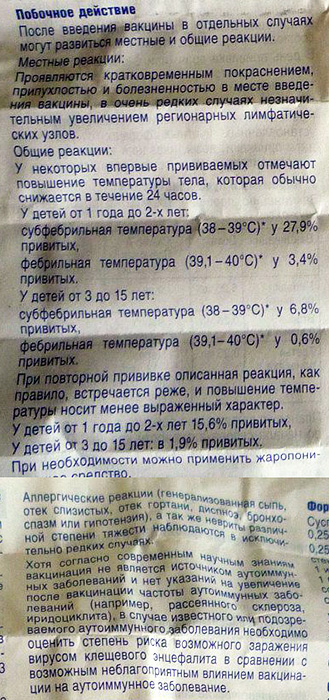
The strength and duration of symptoms may vary, depending on the susceptibility of the organism and the type of vaccine used. In order to minimize the likelihood of unpleasant events after vaccination, one should follow the same recommendations as in preparation for it - eat nutritious vitaminized food (without overeating), minimize the risk of infection with other infections, limit communication with patients, and spend more time in the fresh the air.
A separate issue is contact with water - in fact, you can wash after vaccination and soak it. Another question is that you do not need to rub the injection site with a washcloth or lie in a hot bath while steaming the skin - all this may cause an increase in adverse reactions.But you can wash yourself under a slightly warm shower, and you should not worry about it.
On a note
Within an hour after the first vaccination, you cannot leave the medical facility, but you should remain under medical supervision. The fact is that it is during this time that the real possibility of anaphylactic shock, albeit insignificant, but still exists. Therefore, the hospitals that are being vaccinated are equipped to provide emergency assistance at the first symptoms of severe allergies.
When does vaccination make sense to refuse even in a potentially dangerous region?
Neglecting vaccination without good reason is an extremely risky undertaking. People who refuse to be vaccinated for moral convictions and principles, or who believe in conspiracy theories on this topic, completely unreasonably expose their lives to real danger.
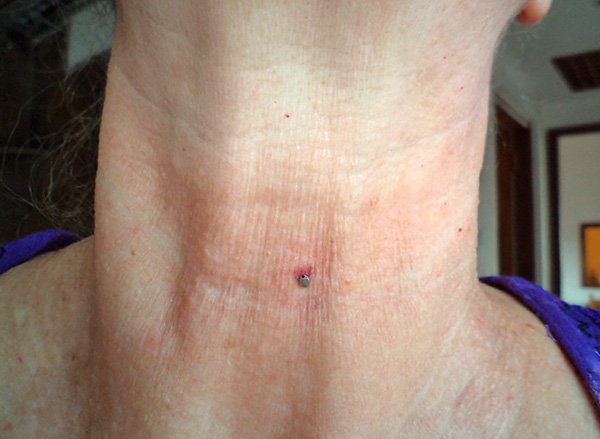
Parents who endlessly write on the same pattern refusals of all vaccinations for their children can greatly regret this in the future, faced in practice with the disease in a child. Therefore, when deciding whether or not to vaccinate, one should think about how many hundreds of thousands of people over the past years have saved the vaccine from death and disability.
So, only in Russia from 2000 to 3000 people get tick-borne encephalitis every year.10–20% of them after recovery have lifelong psychological or neurological consequences (up to severe mental and nervous diseases leading to disability), and about 12% of cases of the disease end in death. The vaccine and a special method of its introduction were developed precisely in order to reduce these indicators and protect people of all ages from the disease, and in the future - to completely eliminate the danger of this infection.
However, there are situations where vaccination is strictly contraindicated. In such cases, the potential risks exceed the beneficial effects. Among the contraindications are all diseases in the acute stage, the presence of bronchial asthma, as well as a severe reaction to the previous vaccine.
It is not recommended to be vaccinated to women during pregnancy and it is necessary to caution vaccination against EC during lactation. There is no unequivocal evidence of the harm of the vaccine, but safety has not been finally confirmed, so each case is considered individually.
The same applies to children under three years old. Despite the fact that children's vaccines are on the market, due to the poor knowledge of the impact on a vulnerable children's body, they are still recommended for use no earlier than 2-3 years of age.
On a note
Interestingly, the anti-encephalitis vaccine is noted in the preventive vaccination calendar for epidemic indications. And this means that in a dysfunctional tick-borne encephalitis region, any person should be given a course of vaccination completely free of charge when providing a compulsory health insurance policy. But in practice, not every hospital has everything that is needed, and in the case of a free course of vaccinations, it will not be possible to choose the type of vaccine.
If there is a desire to put a vaccine on a fee basis, then you can buy vaccine at a pharmacy only by prescription (for example, in Moscow and St. Petersburg, Tick-E-Vac costs about 600 rubles). Usually, it is immediately provided in a medical institution, while the cost of an imported vaccine will be approximately twice as high as the price of a Russian drug.
It is important to remember that simple prejudices about vaccinations, not justified by real contraindications, can cause the development of a serious illness with irreversible consequences. If there is good reason to take root, then it must be done.
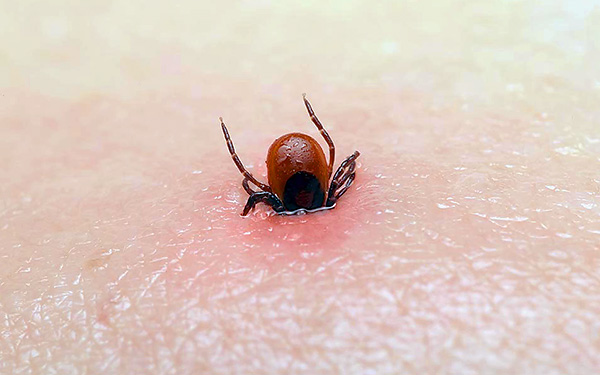
For people permanently living in regions unsuccessful for tick-borne encephalitis (or intending to go to such a region), vaccination is not just a desirable, but a necessary step. Tick-borne encephalitis is too serious a disease to neglect preventive measures and rely only on the strength of its own organism. Properly conducted vaccination complex allows you to save the lives and health of thousands of people every year.
It should not be forgotten that the vaccine only protects against the KE virus, but not from other diseases that the parasites can also tolerate. Therefore, it is necessary to be careful in places of possible accumulation of ticks, as well as to control one’s condition after the bite itself.
If you have personal experience with tick-borne encephalitis vaccination, be sure to share the information by leaving your review at the bottom of this page. What vaccine you used, whether the injection was painful, whether there were side effects after it - any details would be helpful to the readers.
Does vaccination really save tick-borne encephalitis?
And in this video clearly shownwhat neglect of vaccination can lead to ...

